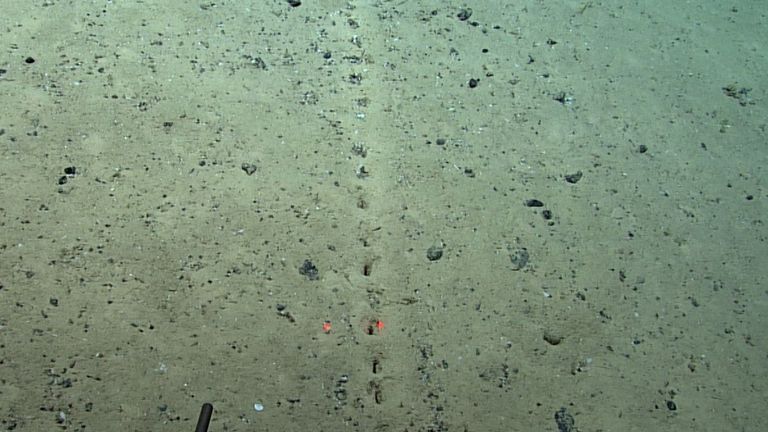Images show mysterious 'perfectly aligned' holes beneath Atlantic Ocean - and nobody knows what made them
"While they look almost human made, the little piles of sediment around the holes make them seem like they were excavated by… something," says the US National Oceanic and Atmosphere Administration.
Wednesday 27 July 2022 11:30, UK
Scientists have discovered a series of mysterious "perfectly aligned" holes in the sediment 1.7 miles beneath the surface of the Atlantic Ocean - and do not know what has caused them.
They were found by the US National Oceanic and Atmosphere Administration (NOAA) while conducting an exploration of the sea bed around the mid-Atlantic Ridge using a remotely operated vehicle.
The holes, which could be vents or trails, were found in the sediment near the summit of an underwater volcano north of the Azores.
In a post on Facebook, NOAA acknowledged that the holes had previously been reported from the region - "but their origin remains a mystery".
"While they look almost human made, the little piles of sediment around the holes make them seem like they were excavated by… something," the agency wrote - before asking its followers to suggest their ideas.
Several people questioned whether a machine had taken sediment samples, or bedrock shifting beneath the bottom of the ocean releasing methane which has bubbled up from inside the Earth.
Some of the answers with less evidence to support them included aliens and "something left over from Atlantis", while a more rational proposal suggested: "It looks like the sediment falling down through openings, not pressure blowing upward."
"If there could possibly be something like a submarine buried under there that shifted and sediment fell down through the vents/holes of the outer casing," they added.
The underwater exploration was meant to be uncovering the submerged mountain range, but the photographs captured on 23 July have baffled scientists.
NOAA says that the mid-Atlantic Ridge has "active tectonic spreading" and is the site of frequent earthquakes, as well as a hotbed of hydrothermal vents.




